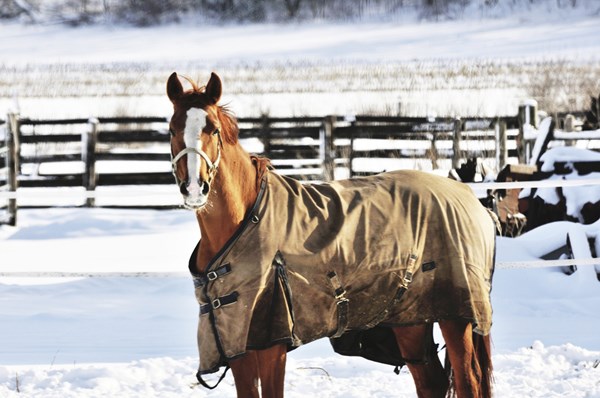 Credit: Thinkstock Contrary to popular belief, a bran mash will not warm a horse in the bitter cold.
Credit: Thinkstock Contrary to popular belief, a bran mash will not warm a horse in the bitter cold.Have you noticed more horse owners asking for wheat bran in the wintertime? It’s likely these well-meaning folks are brewing homemade bran mash for their charges. What’s in a bran mash, you ask.
Here’s an easy recipe. The two basic ingredients, simply enough, are wheat bran (not rice bran) and boiling water. The amount of water used depends on the desired wetness or sloppiness of the mash. Blend thoroughly and steep for at least 15 minutes, covering the bucket or feed tub with a towel. Just prior to feeding add any other ingredients that may tempt a horse to dive in. Some oft-used additives include diced apples, sliced carrots, a pull of molasses, or a handful of oats. All of this, of course, depends on the palate of the recipient. Voila, a bran mash is created.
Bran mashes remain a staple in the feeding regime of some horsemen and continue to be a traditional meal for horses recovering from sickness, for mares immediately following foaling, and for aged horses with dental problems. A bran mash is often the meal of choice for horses following an intense workout, especially for those that do not drink adequately during or after intense exercise and teeter on the brink of dehydration.
Is this slurry of bran and water that magical, or are all of those purported applications outdated, mere relics of days long gone?
From a nutritional standpoint, wheat bran, as is often said in the South, “ain’t much.” Aside from the B vitamins niacin, thiamin and riboflavin, wheat bran offers little in the way of nutrition. Even as a fiber supplement, wheat bran contains only 10-12% crude fiber, which is considerably less than other sources of fiber such as beet pulp (20%) or grass hay (28-34%).
In terms of macromineral balance, bran mashes can be problematic. While no cereal grain or grain byproduct contains an equal ratio of calcium to phosphorus, wheat bran contains an exorbitant amount of phosphorus. If fed often enough, the imbalance in wheat bran may cause skeletal problems, particularly in young horses, but the occasional bran mash will not upset body-wide mineral levels. Avoid feeding bran mashes to young horses, and do not allow mashes to constitute more than 10% of the daily ration of an adult horse.
In recent years, bran’s long-standing laxative properties have been under fire. For decades, horsemen have believed that bran may prevent colic in horses by keeping ingesta flowing smoothly through the digestive system. Research, however, suggests otherwise. In fact, a study conducted at Cornell University completely denounced this tightly held myth. Fed wet or dry, wheat bran was found to have no notable effect on the moisture content of stool. Even when fed in its most sloppy state (imagine watered-down applesauce), fecal water content only increased 3%. How do researchers explain the loose manure that many horses offer up the day after a bran mash is given? Pin that on subsequent, though mild, digestive upset caused by the sudden change in diet, researchers believe. Other scientists feel that bran mashes may even have a negative effect on the gastrointestinal tract’s resident population of fiber-fermenting microbes.
Contrary to popular belief, a bran mash will not warm a horse in the bitter cold. That job is most effectively achieved by meting out appropriate amounts of forages, as more body heat is generated through the digestion of hay and other roughages than any grain or grain by-product.
While up-to-date research puts the lore and lure of bran mash on shaky ground, periodic feeding may have its place in the diets of some horses. A finicky eater may not be able to resist the temptation of a warm bran mash, and there simply may not be a better way to disguise medications than to diffuse their bitterness in the pleasantness of a bran mash. If medications are added to the mash, sprinkle them in just prior to feeding because cooking may alter their effectiveness.
Article courtesy of Kentucky Equine Research. Visit equinews.com/newsletters to subscribe to The Weekly Feed, KER’s award-winning equine nutrition newsletter.



